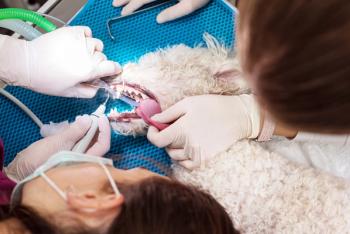
The vital value of treating patient pain
Detecting and relieving pain can be just as essential as resolving the cause of it
“Pain should be the fourth vital sign. So, every physical exam should include not just temperature, pulse, and respiration, but also assessing pain in the patients that present to us,” Kristen Cooley, BA, CVT, VTS (Anesthesia/ Analgesia), an independent veterinary anesthesia and pain management consultant, told attendees at the Veterinary Meeting and Expo (VMX) in Orlando, Florida. Cooley began her presentation, “How they tell us when they hurt; recognizing pain in veterinary species”1 emphasizing the importance of evaluating pain in every patient case. She later explained that there are often times a patient does not easily present signs of pain or discomfort, and is overlooked, when in reality, the patient was masking their pain and their condition was severe.
After stressing the importance of evaluating and addressing pain, Cooley also was quick to mention that pain can also be difficult to observe. “Pain is subjective and individual. Every patient, every person, is unique, because everybody has their own distinct physiology… patients come to the veterinary clinic with different experiences and different stress responses and just a different makeup. And that changes the way that they are going to experience pain, and the way that they're going to show pain. So, we have our work cut out for us, it's not an easy task to pick up on subtle signs of pain in animals,” she said.
Identifying acute pain vs chronic maladaptive
Whether the pain presented is acute or chronic, Cooley explained that rapid detection and treatment is crucial. With patient triage, even if a painful patient cannot be seen right away, treating their pain, first, is necessary for preventing the pain from being prolonged while waiting for the doctor. Cooley explained that controlling pain helps speed healing and uncontrolled pain can lead to immunosuppression.
Acute pain
Cooley described acute pain as adaptive and short-lived. This kind of pain in animals is usually based on tissue damage and/or inflammation. It is often intense, but with a treatment endpoint and can be evaluated with traditional pain scales to identify the severity of the pain.
Chronic maladaptive
Chronic pain is usually more identifiable by a gradual change in behavior and mobility. When the pain is maladaptive, according to Cooley, it “makes changes to the nervous system” and “can lead to these abnormal pain states.” These abnormal pain states include central sensitization, hyperesthesia, and allodynia.
Pain scales
“Everybody should have them in their practice. Everybody should be using these because it's really important and it really helps with communication,” said Cooley. Traditional pain scales usually only work on evaluating acute pain, but are also species specific for dogs, cats, horses, exotics, etc. According to Cooley, the most effective pain scale will be easy to use, validated by health professionals, and provide an intervention point, meaning that if the patient’s pain reaches a certain point, a method of treatment is recommended. She also mentioned that these pain scales should have minimum bias, whereas there should not be much variability between users. If one staff member evaluates pain, another staff member should get the same result.
Client evaluation
Since traditional pain scales work better with acute pain, client evaluation can be helpful in identifying chronic pain. Sending clients home with a questionnaire about their pet’s behavior and mobility can help detect signs of pain that are not easily seen in the exam room.
Reference
Cooley K. How they tell us when they hurt; recognizing pain in veterinary species. Presented at: Veterinary Meeting and Expo; Orlando, Florida. January 14-18, 2023
Newsletter
From exam room tips to practice management insights, get trusted veterinary news delivered straight to your inbox—subscribe to dvm360.





